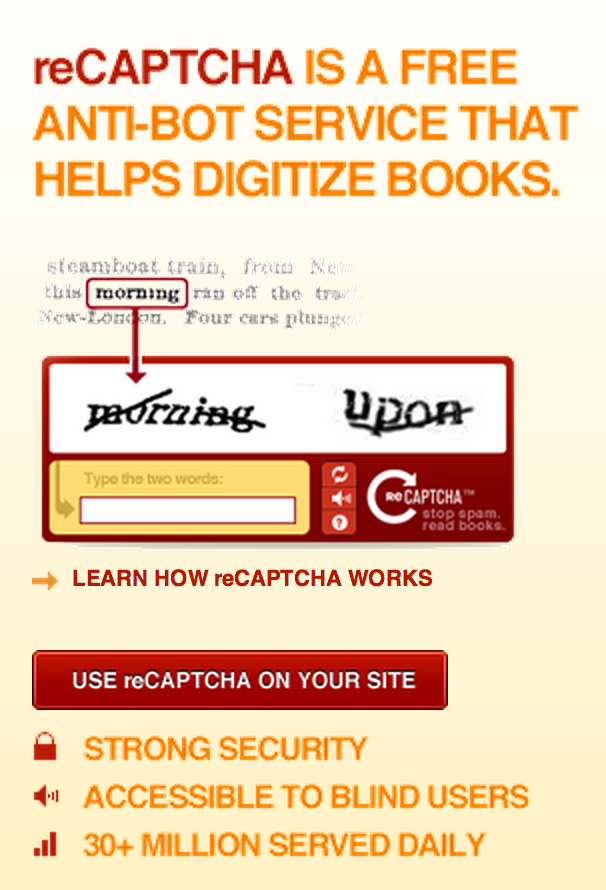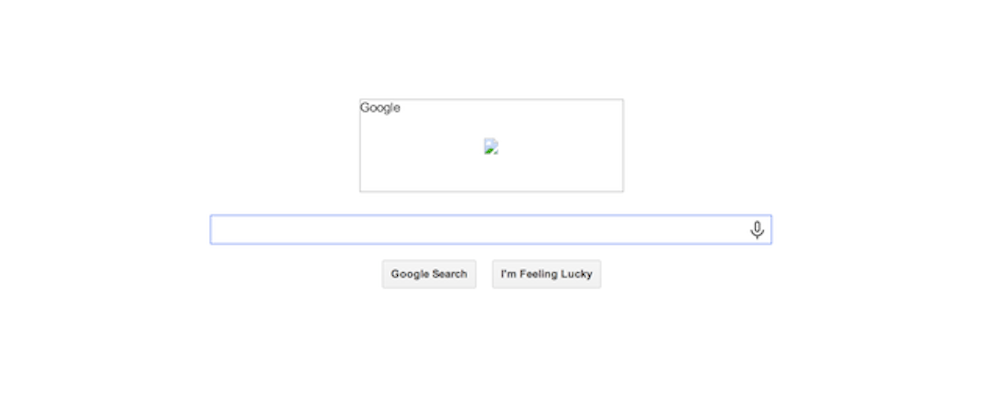Killing Time, Pt. [9] - User Friendly
{category_name}

Customers become working partners. - Clive Thompson
There was one colossal, intolerable problem facing CAPTCHAs, an otherwise perfect tool in the fight for sanctioned value: waste. A CAPTCHA puzzle is meaningless and incoherent, and the effort of deciphering was lost into the ether once it was completed. Objects without purpose and actions without results do not last long in a system as efficient as capitalism; irreproducible energy spent is an unrecoverable loss of precious resources. [1] For Georges Bataille, the destruction of wealth defined early, pre-capitalist societies. The development of capitalism's denial of excess was enabled in part by the collapse of the various religious doctrines that demanded such extravagant wastes.
Luis von Ahn, who worked on the team that created CAPTCHAs and became the face of the technology, armed himself with a theory of human computation and developed reCAPTCHA. reCAPTCHA is a free CAPTCHA service that contributes to the digitization of books, old newspapers, and et al. It mostly concerns itself with dead technologies and outdated media. According to some measurements, CAPTCHAs were being solved at a rate of 100 million a day. reCAPTCHA, rather than merely generating a randomized, nonsensical puzzle like its predecessor, imports unidentifiable text that optical character recognition software stumbles over during archival digitization into new CAPTCHA puzzles. reCAPTCHA was bought by Google (who else?) for its Google Books project and subsequently re-sold to websites across the web. Though it's marketed as a free service, remember TANSTAAFL. It became another one of the many tools that Google can offer. There was money to be made yet!
reCAPTCHA, in effort to process what are actually defined as un-processable words, must hedge the original bet of CAPTCHAs. [2] The user in reCAPTCHA is presented with two words, one of which the computer knows and the other it does not. If the user correctly inputs the first control word, it is assumed the user is human and has correctly solved the second, unknown word. Predictably, none other than crowd-sourcing solves the essential problem of (the) unknowability (of the second word). At least three users must agree on the second word before it is submitted as a viable answer.
Uncertainty is not a practical problem for reCAPTCHA. During monitored tests, reCAPTCHA had a 99.1% accuracy rate. In order for reCAPTCHA to re-produce this data entry as productive labor, though, it must conceptually undermine its original form. With a CAPTCHA, while the program is designed to generate a puzzle it knows other computers cannot solve, it still knows the correct answer. With reCAPTCHA, it does not. Assumed to be entered correctly only after others solving the same puzzle affirm it, reCAPTCHA is programmed to accept all answers. Though the success rate is near-perfect, accuracy or correctness is a secondary concern to creating and valorizing productive micro-labor. Or, rather, both issues are conveniently collapsed together. This is, essentially, not about spam anymore. In order to make reCAPTCHA work, the ‘reverse’ Turning Test is not a test at all, but a vehicle for work.

reCAPTCHA words take no more than a few moments for humans to interpret, but are the most difficult words for a computer to process in the first place. Von Ahn observed that “users of websites that switch to using reCAPTHCA typically complain less often than when the sites used a difference type of CAPTCHA…due to some users being more willing to accept reCATPCHA because their work is contributing to the digitization of human knowledge.” Results show a clear advantage to the reorientation of CAPTCHA puzzles into reCAPTCA digitization, but also proof of a “more general idea,” according to von Ahn:
“Wasted human processing power can be harnessed to solve problems that computers cannot yet solve. Some have referred to this idea as ‘human computation’. In previous work, we have shown that such processing power can be harnessed through computer games: people play these games and, as a result, collectively perform tasks that computers cannot yet perform…here we have shown that CAPTCHAs constitute another avenue for ‘reusing’ wasted computational power, while serving the useful purpose of preventing automated abuse over the Internet.”
Rather quickly, the original CAPTCHAs have become a nuisance. reCAPTCHA on the other hand has, as von Ahn et al. write, “a positive impact on modern society by helping digitize human knowledge.” Univocally, it is true; reCAPTCHA assists in the digitization of human “knowledge.” But the two necessary supporting ideological proofs – digitization of human knowledge is entirely good and the coercion humans to do that work is beneficial for the whole of society – are far from universal truths. Who reaps those rewards? [3]
In one interview with von Ahn, he and Clive Thompson, a writer for Wired, are playing one of the games that von Ahn is developing called Matchin’. Two users at two opposite terminals (much like the Turing test participants) are shown matching pairs of pictures. They each select which one they find to be prettier. When they both select the same image, the selected image is marked as prettier and that data is stored away. After many plays, the data amounts to an objective, computational aesthetic judgment of beauty.
On their own, computers and A.I. cannot make these determinations. With the Matchin’ data, they can make them a priori, creating a program (or algorithm) with quantitative measurements corresponding to something like a(n) (human) aesthetic sensibility. Like the labor of reCAPTCHA, this is work of human computation: “the art of using massive groups of networked humans minds to solve problems that computers cannot.”
The goal of von Ahn is explicit. Thompson explains that he “wants to harvest every idle moment in our lives and turn it to productive use,” because if anyone, everyone, “could be coaxed into enjoying a game that contributed to solving a computing problem it would produce billions of man hours of labor each year.” [4] Let us note the procession of the various parts of speech: harvest, turn, use, coax, enjoy, contribute, solve, produce, idle, lives, game, computing, problem, billions, hours, labor.
The goal of von Ahn is explicit. Thompson explains that he “wants to harvest every idle moment in our lives and turn it to productive use,” because if anyone, everyone, “could be coaxed into enjoying a game that contributed to solving a computing problem it would produce billions of man hours of labor each year.” [4] Let us note the procession of the various parts of speech: harvest, turn, use, coax, enjoy, contribute, solve, produce, idle, lives, game, computing, problem, billions, hours, labor.

The problem facing von Ahn was how to corral into delicate balance the antagonism between work and play, to subsume the competing drives towards a unified goal. We are, after all, at the dawn of the Ludic Century. Users will gladly “contribute their brainpower, but only if they’re given an enjoyable, time-killing experience in exchange.” The theory is: quality play is well enough pay so long as it appears to be time well spent. From the Wired article, now taken down:
“Most projects that harness human processing power rely on a different motivator: money. Many companies use Amazon’s Mechanical Turk to farm out informational piecework, usually for about 10 cents a task. These are often quick-hit recognition jobs that computers can’t perform. PriceGrabber.com uses thousands of Web surfers to update its catalog by hunting down and in putting descriptive information on products. A mapping firm called Geospatial Vision hires crows to pore over satellite pictures of cities and identify tiny features like lampposts and road signs. ‘There are 6 billion human beings in the world. We could do a lot of stuff if we all work together,” says Peter Cohen, director of Mechanical Turk.”
In the eyes of a so-called first world citizen, a micro-payment of a few cents may not seem to be much different than nothing at all – he or she may rather play a game instead. For those without that luxury, these tasks are quite literally their jobs. [5] Von Ahn struggles not with the ethical or moral implications of his philosophy (there are none, it appears) nor with questions of what is taken, who has the advantage or where the profit ends up, but instead with his own task: because “it’s so devilishly hard to make things fun.” The whole discourse sings a familiar refrain. Again, Thompson:
“The stakes are high. Every day, thousands of spam blogs are created that threaten to corrupt search results, and companies like Ticketmaster lose consumer confidence when scalper-bots jump the queue for tickets.”
reCAPTCHA does not just protect the internet, but provides a public service at the same time. Von Ahn’s false equivalency, dangerous already, is more even more sinister in light of its simplicity: “Every time somebody does one, they basically waste 10 seconds of their life...so the question is, can we get you to do work for those 10 seconds?” Time wasted and work are interchangeable when placed on the same plane. Further still, this is not just any time, but your life-time. For flourish, why not add an existential imperative – you would not throw away your life, so why waste any time? Why let anything go to waste? You are only here for so long.
“Play is the unexpected glue that lashes human brains together into a global overmind,” says Thompson, the writer here whose role is apparently nothing more than a spokesman; yet that play is tenuous, hesitant, and multi-faceted. The aim is off. We privilege human computing and understanding over computers because of humanity’s brilliant simplicity. That lack of sophistication – the ease with which we process characters, for example – is co-opted into a large-scale economic activity because it is one thing that our machines just aren't good at, yet. There as always been a limit to the skill of machines, always something just out of their reach.

It does not seem to be considered that there are, perhaps, some things that computers should not do at all. This is the totalizing siren song of the technology sector. Woefully, Von Ahn realized in CAPTCHAs “that he had unwittingly created a system that was frittering away, in ten-second increments, millions of hours of a most precious resource: human brain cycles.” That is, has been, and always will be, unacceptable. Thompson, one more time:
“Since the late 1990s, scientists have been recruiting people to download special screen savers that devote spare computing power to projects ranging from the search for extraterrestrial life to climate modeling. The difference with reCAPTCHA is that humans are doing the computing, without necessarily realizing it.”
Again, this is a conceit both von Ahn is more than willing to make, because there is a higher ethico-moral purpose being served. The irony is just almost unbearable - Von Ahn: “We could do other things, like digitizing checks, but banks already make enough money.”
reCAPTCHA takes something that the user was already forced to do by capitalism and puts them to work for capitalism. We acknowledge that obviously UBE and spam is an annoyance, and potentially dangerous if filled with malware. But so is advertising and marketing in general. It is just that those industries have finally gotten so good at doing it the distinction between art and the market, between ads and entertainment, between work and play, has been eradicated. Ads can be fun, too. Forget football, we watch the Super Bowl for the commercials.
The problem with UBE is that it was never allowed any legitimacy or space, always defined as criminal, because it was a problem for business. The limited legislation on the books for UBE does not even address its most common form. So, again, capitalism must solve its own problem with its own tools, allowing room to perfect those tools in their form, design, and function. Easily and deliberately lost in translation (as code is most certainly far from the vernacular) is that the ultimate function of capitalism is the generation and regeneration of more capital, achieved in part through the perfection of exploitation. Pleasure in the job, perfection in the work.
[Notes]
[1] Not to mention, rather obviously, money and value.
[2] The original bet being that, while a computer generates the puzzle, it cannot solve it. In the case of reCAPTCHA, the computer essentially can do neither.
[3] Respectively - Western knowledge, capitalism, computer users, technology companies.
[4] Emphasis added.
[5] Any lingering doubt to be had on the relevance of an object like reCAPTCHA (now 5 years old) should be exocrised in light of the April 1st issue of the New York Times Magazine. Running a short piece on human computation that encapsulates the popular attitude towards these technologies, the position of the article is a performance of an attitude that has its foundations in the unasked questions of 5, 10, 15 years ago. Annie Lowrey notes that mTurk labor, concentrated in India, is improving computer programs, but embraces a positionless utopian ideal that perhaps this microlabor will, maybe in the long run, improve employment and stuff like that at some point, but also what a curiosity this computer stuff is! We humans are "remarkably adept...the challenge, in other words, is for humans to allow software, algorithms, robots and the like to propel them into higher-and-higher-value work." More company dribble, uncritical sophistry disengaged from the real organization of the web and its many facets, the mechanisms of its power control. "For now, at least...my job is safe." It will indeed be a day of celebration when computer algorithms can handle the bulk of the first-person press release that is most of online "culture" writing today. May it happen swiftly.
[Works]
Thompson, Clive. "For Certain Tasks, the Cortex Still Beats the CPU." Wired. Conde Nast, 25 June 2007. Web. 1 Mar. 2013.